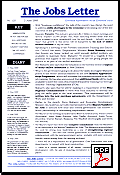



|
 |

|
| No.203 | 29 March 2004 | Essential Information on an Essential Issue |
of key events over the last few weeks. AUSTRALIA: ONE IN FIVE IN POVERTY POINTERS TO REDUCING CHILD POVERTY IN NZ UNEMPLOYMENT TO RISE WITH THE DOLLAR WHAT WAS IMPACT OF RAISING THE RETIREMENT AGE? SMOKERS MAY NOT GET JOBS ASIAN STUDENTS PAYING FOR JOBS DUNEDIN PITCHING FOR SKILLED WORKERS GREEN WARNING ON CHARITIES BILL MORE ON OUTSOURCING: SECURE JOBS CAN’T BE ‘ROUTINISED’ FLEXIBILITY AT WORK  LAST Letter
LAST Letter
NEXT Letter   Download this issue as a PDF file
Index to Features
10 March 2004One of two Taskforce Green teams begin to work helping with the clean-up of farmland in the Wairarapa. The project is a joint effort between Winz, the Greater Wellington Regional Council and Federated Farmers. The worldwide shortage of information technology skills is the main agenda item of an Asia-Pacific Economic Co-operation (APEC ) meeting of Science and Technology Ministers in Christchurch. The practice of paying incentive payments is becoming increasingly widespread in NZ, according to an Employers and Manufacturers Association survey. Chief executives earn 21.5% of their salaries in the form of bonuses and incentives. Performance bonuses, on average, make up 6.4% of non-managerial skilled and semi-skilled workers' income. The Ministry of Women's Affairs publishes what it says is NZ's first action plan across the whole
of government for women's issues. Minister Ruth Dyson: "The action plan identifies three key themes
for women _ having enough income to care for themselves and their dependents, work/life balance,
and general well-being. Action Plan for New Zealand
Women, published by the Ministry of Women's Affairs March 2004, can be downloaded
here19 pg, 2.95Mb
US jobseekers can access their own employment background check (for $24.95) through Yahoo! HotJobs.com. American Telephone and Telegraph is to cut 4,600 jobs this year, after having cutting thousands of jobs last year. 11 March 2004The Reserve Bank of New Zealand asks the Minister of Finance for the authority to buy or sell its foreign exchange reserves in order to try to influence the value of the NZ$. The Australian unemployment rate rises to 5.9% with net job growth at only 1,300 jobs. Australia lost 13,100 full-time jobs last month but a rise in the number of part-time jobs off-set the decline. US president George W Bush warns that country's economic strength and job growth could be put in jeopardy unless it pushes for free-trade policies. The US trade deficit jumped to a record high in January, adding to the anxiety American workers have about their jobs. Congressman Sherrod Brown: "These workers look at this trade deficit and fear their jobs will the next one shipped overseas." 12 March 2004The fraud conviction of former Ministry of Social Development employee Lisa Clement should not influence the view that NZ'ers have of their public servants, according to the Public Service Association. National secretary Richard Wagstaff says that the PSA has 42,000 members and an extreme case of fraud by an individual must not detract from the efforts of the overwhelming majority who are meticulously honest. The threat of currency intervention by the Reserve Bank appears to have curtailed the demand for the NZ$ which is trading, at under $US.66, significantly lower than in recent weeks. The government budget surplus for the seven months to the end of January was nearly $4.9 billion, nearly $1 billion more than the Treasury had forecast just a month earlier. The US government is proposing to spend $500 million on a "Jobs for the 21st Century" initiative to help workers get trained and educated. US Secretary of Labor Elaine Chao says that half of the fastest-growing occupations, including physicians assistants, physical therapists and computer software engineers, require at least a bachelor's or associate degree. 14 March 2004The subsidy for placing a jobseeker through Job Plus Maori Asset is, in practice, nearly twice the subsidy provided for someone under the general Job Plus scheme. Job Plus Maori Asset scheme was established in 1995 to help Maori businesses establish themselves by providing a longer subsidy period for employees, as these businesses were seen to have fewer cash assets. Job Plus Maori Asset and Job Plus offer the same benefits, but is paid out at different levels and duration depending on the length of time the jobseeker has been without work and their level of disadvantage in the local labour market. Job Plus subsidies average $2,467/placement while Job Plus Maori Asset averages $4,587/placement. Waikato fruit growers are having difficulty finding enough workers to pick apples and kiwifruit. Hamilton East MP Dianne Yates says that although there are 7,697 registered unemployed people in the district, these people were not suitable for picking work. Some workers are bussing daily from Tauranga, Te Puke and other parts of the Bay of Plenty to work in Waikato orchards. US Federal Reserve Bank chairman Alan Greenspan urges Americans not to turn high anxiety about job losses into support for protectionist trade measures. Greenspan says it would be more fruitful for the US to consider reforms in the education system to ensure workers could obtain the technological skills needed by the economy. 15 March 2004Ten months after "stress" was formally recognized as an occupational health hazard in NZ, it is too early to see an increase in legal prosecutions based on stress. But stress is now being tagged onto nine out of ten legal grievances taken out by employees against their employers, according to employment relations lawyer Karen Spackman. Occupation Health and Safety has drawn up guidelines to combat shiftwork-induced exhaustion and is asking for public input. Draft documents can be found here 16 March 2004An EEO Trust survey finds 81% of its respondents say they are more productive at work if they have good personal relationships at home. When asked how their workplaces could better support their personal relationships, they listed flexible working hours, and having a manager trained in awareness of how work practices impact on relationships. 37% of the respondents say a secure and permanent job would help. The government says there were 126,870 people in industry training in 2003, a 19% increase on the previous year. The government's target is for there to be 150,000 people engaged in industry training by 2005. The National Party leader (and former Reserve Bank Governor) Don Brash does not support allowing the Reserve Bank to buy and sell currency to affect the price of the NZ$, saying it is `fraught with risk". Minister of Social Services Steve Maharey is questioned in parliament over funds paid out to Fuarosa and Saralia Tamati under the Community Employment Group (CEG) Social Entrepreneur Scheme. The Christchurch-based Tamatis travelled to the US, Fiji and Samoa over a 70 day period studying hip hop music and culture. National MP Katherine Rich says more than $26,000 was spent on the trip which "could hardly have been more vague or more ludicrous". The Social Entrepreneur Fund allocates $750,000 each year "to people who have demonstrated leadership and innovation in the fields of youth, welfare, health education, employment or economic community development". Other projects funded included establishing of arts centre, a history of the Ratana faith, establishing a Disability Arts Festival and a prison-based theatre scheme. 17 March 2004The cost of running a beef or sheep farm has virtually remained static, putting on-farm inflation at zero percent, according to agricultural economist Rob Davison. This is the lowest underlying rate of on-farm inflation in 30 years. In Britain, three men and a number of accomplices are convicted of immigration offences including forging documents and placing illegal immigrants into work. The fraudulent business had earned them more than $11 million. People creating fraudulent employment recruitment businesses are exploiting the combination of Eastern Europeans desperate to get work, and some British farms and factories who are eager to hire cheap labour. Latest US Bureau of Labor statistics show that job growth, in industries such as information technology, health care and construction, is projected to expand so rapidly that employers could have a hard time finding skilled workers within the next 15 years. Jobs for computer software engineers are expected to grow by nearly 50%, while the demand for medical assistants is projected to grow by nearly 60%. 18 March 2004As many as 80 forestry contracting jobs could go in the Central North Island as management at the Kaingaroa Timberland, the country's second largest forestry estate, decides to extend the life of it trees before harvest. Over the past ten years, the age of trees that Kaingaroa has been harvesting has fallen from 30 years to 26 years and the company intends to reverse this. In the longer term, the forest owners say those who process the timber will have larger, more profitable logs to work with. A 12-week construction skills programme is to be run by the Waiariki Institute of Technology. The course, fully funded by Winz, will give participants an entry-level national certificate in elementary construction skills. Employment Court judges attempt to clarify what the government means by "good faith" in the Employment Relations Law Reform Bill. Judge Goddard: "It is, to the legal mind, an enormous leap from the pursuit of self interest to the commission or display of an attitude of bad faith." More media and political outcry erupts over the CEG Social Entrepreneur Fund as Katherine Rich reveals that $7,000 was paid for two women to travel to the United States to study ways to encourage gay and lesbian Maori and Pacific Islanders to take part in sport and cultural activities. 19 March 2004One year anniversary of the US-led invasion of Iraq. Immigration figures continue to slow down but are still positive. Net long-term immigrants were 2,150 in February, down from 2,590 the month before. Over the last 12 months NZ has gained 30,100 migrants. The slow down in immigrant numbers may ease the pressure on the building sector, according to Macquarie Bank economist Richard Gibbs. Katherine Rich questions whether the $23m administered by the Department of Labour for community employment and development is being spent wisely. She calls for an inquiry into the 1300 grants given out by the Community Employment Group (CEG). CEG General Manager Charlie Moore says that recent revelations over the Social Entrepreneur Fund have forced the agency to review its spending. 20 March 2004The government reveals it froze the Social Entrpreneur scheme administered by the Community Employment Group (CEG) last November. The scheme has come under scrutiny after several unusual "social entrepreneur" project make newspaper headlines. Media reports reveal that CEG supported social entrepreneur Fuarosa Tamati has close family relatives on the staff of funding agencies. Her husband, Vic, is a funding adviser for the Department of Internal Affairs and her brother-in-law works as a field worker for CEG, the agency that awarded the $26,000 Social Entrepreneur grant. Media also reports that Tamati also took a stopover in Paris which she did not disclose to CEG, and that she and her daughter used some of the cash to "chill out" in Hawaii and Fiji. 22 March 2004New Zealand trade negotiators are in Thailand in pursuit of a closer economic partnership. The Green Party urges the government to call-off free-trade negotiations with Thai government until Thailand ratifies core international labour and human rights conventions. Co-leader Rod Donald says that NZ has no business negotiating a free trade deal with a country that does not meet even basic standards of justice and sustainability with regard to labour conditions, pay rates, human rights and environmental protection. More flak flies in the media over the CEG Social Entrepreneur Fund. The government reveals that Steve Maharey had asked for a review of the scheme last August, and that was why the fund was frozen and that was why the fund had been frozen since November.
 LAST Diary
LAST Diary
NEXT Diary 
|
AUSTRALIA: ONE IN FIVE IN POVERTY A 15 month-long Australian Senate inquiry has found that more than 20% of Australians live
in poverty. The report, A hand up not a hand out: Renewing the fight against
poverty, criticises the decline in income for poor households and emphasises the central role of employment opportunities
in tackling poverty. A 15 month-long Australian Senate inquiry has found that more than 20% of Australians live
in poverty. The report, A hand up not a hand out: Renewing the fight against
poverty, criticises the decline in income for poor households and emphasises the central role of employment opportunities
in tackling poverty.
Between 1984 and 1999, the top 20% of Australian income earners saw a 1% increase in their disposable income, while the poorest 20% saw a 10% drop. Poverty rose from about 11.3% in 1990 to 13% in 2000. Twenty-one per cent of Australians — about 3.6 million people — live on less than $A400 per week, which is $31 less than the full-time minimum wage. One million Australians are considered to be poor although they live in households where at least one adult works. And 700,000 children are growing up with neither parent working full-time. The report also found that the poorest 20% of the population use government services less than people in the next two population bands. The report: "Economic growth is vital but only because it represents the path to greater prosperity for everyone. The evidence to this inquiry demonstrates that the kind of prosperity we are achieving is being captured by a few at the long-term expense of the many. The Commonwealth's indifference to, or acceptance of, increasing poverty and inequality as the inevitable by product of a market economy in a globalised world, is out of step with the views of Australians who believe in a fair go for all." — developing a national jobs strategy; — bringing a particular focus on improving assistance to young people making the transition from school to work, training or further education to prevent life-long disadvantage; — conducting a review into the dynamics of the labour force, especially in relation to skill shortages; — conducting an inquiry into the nature and extent of low-paid employment, the problem of casualisation and employment security, and the wages and conditions for contract labour; — guaranteeing six months paid work experience in the public or community sector for those who have been unemployed for more than two years; — providing employment security and social mobility to casual and part-time workers through strengthening their employment entitlements, and; — having an inquiry into the nature of low-pay in Australia, and poverty-proofing the minimum wage by linking it to adequate standards of living.
 The report recommends the development of a National Poverty Strategy to harness the political
will that would be necessary to comprehensively fight the problem. A National Poverty Strategy
would involve a summit of government and key interest groups to highlight the importance and nature of
the issues raised by poverty and poverty of opportunity, and to agree on a broad plan of action. It
would require a co-ordinated approach across government and policy areas, and commit to action within
12 months. The report recommends the development of a National Poverty Strategy to harness the political
will that would be necessary to comprehensively fight the problem. A National Poverty Strategy
would involve a summit of government and key interest groups to highlight the importance and nature of
the issues raised by poverty and poverty of opportunity, and to agree on a broad plan of action. It
would require a co-ordinated approach across government and policy areas, and commit to action within
12 months.
Committee chairman Senator Steve Hutchins: "To rid the scourge of poverty from Australian society we need a national inter-governmental approach that ensures people do not fall through the cracks. We need a strategy to give disadvantaged Australians a hand up when they need it so that poverty is not suffered by the next generation. Without concerted action, children and youth will become tomorrow's disadvantaged adults." To achieve this, the committee recommends that a statutory authority be established that would report directly to the Prime Minister. This authority would develop, implement and monitor the National Poverty Strategy, develop poverty reduction targets against a series of anti-poverty measures, and report regularly to Parliament on its progress. Government members on the committee were in a minority, and have produced a minority report rejecting the findings saying they were politically driven. The Federal Minister for Community Services, Senator Kay Petterson: "It's more about politics, than poverty." The Liberal Senators point out that the Australian minimum wage is among the highest in the world, and that support payments for the unemployed, disabled and seniors were also more generous than other developed nations. The minority report also rejected notions of a so-called "working poor" which the majority report said was already entrenched in Australia as a result of the increasing casualisation of the workforce.
Source — Jobs Australia article 15 March 2004 "Senate releases major report on poverty"; The Sydney Morning Herald 11 March 2004 "Four million live in poverty"; The Age 11 March 2004 "Four million live in poverty: report; The Age 11 March 2004 "Australia's 4.1 million poor people"; ABC Online 11 March 2004 "3.5 million live in poverty: Senate report;
POINTERS TO REDUCING CHILD POVERTY IN NZ New Zealand could reduce its rate of child poverty if it follows policies adopted in Britain,
according to visiting Professor Adrian Sinfield from the University of Edinburgh who is also Vice-Chair of
the Child Poverty Action Group (UK). Five years ago child poverty in Britain was around one-third of
the child population, a similar figure to the New Zealand statistic. Sinfield, says that in 1999 Prime
Minister Tony Blair promised to end child poverty by 2020 and subsequent policy changes have already
brought the rate of child poverty in Britain down by 25%. New Zealand could reduce its rate of child poverty if it follows policies adopted in Britain,
according to visiting Professor Adrian Sinfield from the University of Edinburgh who is also Vice-Chair of
the Child Poverty Action Group (UK). Five years ago child poverty in Britain was around one-third of
the child population, a similar figure to the New Zealand statistic. Sinfield, says that in 1999 Prime
Minister Tony Blair promised to end child poverty by 2020 and subsequent policy changes have already
brought the rate of child poverty in Britain down by 25%.
The UK government strategy has included keeping unemployment down, providing a minimum wage floor, making work pay, and lifting the standard of living of low-income families. One focus has been on providing a better life for all children through a child tax credit. Sinfield says that in the UK, this does not discriminate against families receiving government assistance, as it does in New Zealand. The UK has also retained a universal child benefit despite the economic reforms of the 1980s and `90s. Sinfield: "I am confident new initiatives can be found to lower the rate further. The important change has been from a "social exclusion" approach that blamed the poor for their condition to a "social inclusion", one which looks ahead to a society in which everyone is able to participate and contribute. Source — Press Release Auckland University of Technology 22 March 2004 "An End to Child Poverty in New Zealand?";
UNEMPLOYMENT TO RISE WITH THE DOLLAR Minister of Finance Michael Cullen has warned that he expects unemployment to rise over
the next 18 months. Cullen told a Labour Party regional conference that he is expecting a "more
challenging economic environment" because of the rapid rise in the value of the New Zealand dollar which is
starting to put considerable pressure on exporters. Minister of Finance Michael Cullen has warned that he expects unemployment to rise over
the next 18 months. Cullen told a Labour Party regional conference that he is expecting a "more
challenging economic environment" because of the rapid rise in the value of the New Zealand dollar which is
starting to put considerable pressure on exporters.
Cullen says he supports the Reserve Bank's proposals to intervene in foreign exhange in order to counter the effects of the high dollar. He says that for the third time in the last 20 years we are going through a period of a seriously overvalued dollar and a slowdown in growth will be likely to follow from this pressure on exporters. This will result in what he expects to be a "very modest rise in unemployment". Source — Michael Cullen Address to Labour Party Conference, Wanganui, 15 March 2004
WHAT WAS IMPACT OF RAISING THE RETIREMENT AGE? As the population ages, governments will come under increasing pressure to take a more
flexible approach to the retirement age, according to visiting British academic Richard Disney. New Zealand
is virtually the only country to have raised the age at which people receive the retirement pension —
from 60 to 65 years, over the 1990s — and Disney has studied the impact of that shift. The change saw
a rise in participation in the workforce by older people — not only those in the 60-64 year group,
but most noticeably the group in their 50s. As the population ages, governments will come under increasing pressure to take a more
flexible approach to the retirement age, according to visiting British academic Richard Disney. New Zealand
is virtually the only country to have raised the age at which people receive the retirement pension —
from 60 to 65 years, over the 1990s — and Disney has studied the impact of that shift. The change saw
a rise in participation in the workforce by older people — not only those in the 60-64 year group,
but most noticeably the group in their 50s.
Disney found that raising of the retirement age in New Zealand increased participation in the workforce, and probably increased economic growth as a result. He compared New Zealand workplace participation rates by age with those of Australia over the same period. Disney: "If you assume economic conditions remained the same, the participation rates of New Zealanders aged 55-59 went up by 14%. Now ... there were other factors I am sure ... but Australian participation for the same group went down by 6%." Source — Stuff website, "Raising retirement age positive, 11 December 2003, content supplied by www.supertalk.co.nz, by Rob Hosking, AAP,
SMOKERS MAY NOT GET JOBS Smokers may find it increasingly harder to get jobs amidst an emerging trend among employers
to hire non-smokers who, purportedly, do more work. Examples: Bill Gallagher, chief executive
of Gallagher Group, says his company wants to hire non-smokers because they took fewer breaks.
The Gallagher Group has 520 staff nationwide and is one of the biggest employers in Waikato. And
last November, South Island health agency Crown Public Health refused to include smokers in its
80-strong workforce. Smokers may find it increasingly harder to get jobs amidst an emerging trend among employers
to hire non-smokers who, purportedly, do more work. Examples: Bill Gallagher, chief executive
of Gallagher Group, says his company wants to hire non-smokers because they took fewer breaks.
The Gallagher Group has 520 staff nationwide and is one of the biggest employers in Waikato. And
last November, South Island health agency Crown Public Health refused to include smokers in its
80-strong workforce.
Employers and Manufacturers Association spokespersonman Tony Ward says that as companies instigate smokefree workplaces, more and more would choose not to hire smokers. Ward: "A person does not have a right to smoke at work and that is what is going against them. It is what the Smokefree Environment Act is all about — it gives the power to the non-smoker." The director of anti-tobacco group ASH, Trish Fraser, says that ASH does not encourage a policy of exclusion because it doesn't want to see smokers marginalised. But the Human Rights Commission says there is no law to stop employers discriminating against smokers. Council for Civil Liberties chairman Michael Bott says the practice of excluding smokers from the workplace is a draconian approach. He is concerned that the stance could set a precedent to discriminate against other lifestyle choices. Source — New Zealand Herald 24 March 2004 "Smokers facing fag-end of job market" by Ainsley Thomson.
ASIAN STUDENTS PAYING FOR JOBSAsian students who want to stay in New Zealand must find work in order to maintain their residency status. Irene Huang, a business diploma graduate who has paid a $5,000 recruitment fee: "We need to stay here, we need the job. Job is more important than the money for us." A survey of Asian students who graduated in 2002 showed that a third of them were still unemployed six months after being capped. It also shows that they were twice as like to be jobless as European/Pakeha or Maori. Source — onenews 15 March 2004 "Asian graduates take action"
DUNEDIN PITCHING FOR SKILLED WORKERSThe television commercials highlight traffic jams in Auckland and Wellington, and bus and static billboards in each city have been placed in high-traffic-density areas to contrast with the trouble-free lifestyle in Dunedin. The "Are You Ready?"campaign intends to build on the recently marketed "I Am Dunedin" brand through a testimonial campaign that shows previous immigrants to the city in their new work environment as well as enjoying their new lifestyle. — The "Are You Ready?" Dunedin website can be found at www.WorkOtagoNZ.co.nz
GREEN WARNING ON CHARITIES BILL The Green Party is alarmed by aspects of the government's proposed Charities Bill as the
new legislation enters the Select Committee process. Green Party Community and Voluntary Sector
spokesperson Sue Bradford warns that the Bill, as written, could be an attempt to control or kill off
groups who carry out lobbying alongside their service function, and there is a real danger that
community groups who perform advocacy work will not be eligible for charitable status. The Green Party is alarmed by aspects of the government's proposed Charities Bill as the
new legislation enters the Select Committee process. Green Party Community and Voluntary Sector
spokesperson Sue Bradford warns that the Bill, as written, could be an attempt to control or kill off
groups who carry out lobbying alongside their service function, and there is a real danger that
community groups who perform advocacy work will not be eligible for charitable status.
She describes the Bill as discriminatory and unrealistic as it disqualifies people who have any convictions carrying potential imprisonment of two years or more from being an officer of a charitable entity. This would ban people convicted following political activism, such as Bradford herself, and people with a range of other convictions, unless they successfully applied for a waiver from the new Charities Commission. Bradford is also concerned that that many new reporting requirements may be introduced by regulation after the Bill is passed. Bradford: "Is this Bill a Trojan Horse to bring in very high levels of financial and organisational accountability, with the associated compliance costs, at a time when many groups are collapsing from under funding?" Bradford is calling on community organisations to study the proposed Bill and make submissions to the Social Services Select Committee. Source — Press statement Green Party 23 March 2004 "Green Party warns of dangers in Charities Bill
FLEXIBILITY AT WORKAutoliv Australia's chief executive Robert Franklin says he began introducing changes to work arrangements seven years ago. At the time, he was criticised by other employers for creating unjustifiable precedents but he says they were being short-sighted. It now costs Autoliv $100,000 per year to provide flexible work hours, but reduced staff turnover has saved the company about $3.6 million. The Australian Council of Trade Unions is lobbying the government to allow all workers the option to "buy" six extra weeks annual leave, paid for through money deducted from their regular weekly wages. Source — Weekend Herald 24-25 January "Like time off work? Then buy it!" by Barbara Adam
MORE ON OUTSOURCING: SECURE JOBS CAN'T BE 'ROUTINISED' more on Outsourcing... Changes in the US economy in recent years have made some
people's jobs more valuable and secure than ever, while pushing others — even those with skills generally
regarded as highly valuable — to the margins, according to a special report on "the Future of Work"
in Business Week Online. more on Outsourcing... Changes in the US economy in recent years have made some
people's jobs more valuable and secure than ever, while pushing others — even those with skills generally
regarded as highly valuable — to the margins, according to a special report on "the Future of Work"
in Business Week Online.
The key difference between jobs that are here to stay and jobs that aren't is whether a job can be "routinised", or broken down into repeatable steps that don't vary much. Such jobs are easy to replace with a clever piece of software or outsourced to a lower-paid worker often outside the country. In the US, a substantial majority of the jobs are already non-routine. In the relentless pursuit of productivity, the US companies have demolished millions of routine jobs in manufacturing, clerical work, programming and other fields. But you don't need an advanced degree to have a non-routine job. But you do need to do something that can't be boiled down to a repeatable procedure or that requires a lot of human interaction. The jobs that have survived are those that downsizing experts haven't figured out how to reduce to software or to outsource. Levy and Murnane say that some people will find work as barbers, truck drivers, hospital orderlies, or waiters because those jobs can't be outsourced or done by machines. But wages for these will be depressed because so many people will be competing for the them. — Business Week Online Special Report "Where are the jobs?", 22 March 2004, can be found at www.businessweek.com/magazine/content/04_12/b3875615.htm Source — Business Week Online Special Report "Where are the jobs?" , 22 March 2004, www.businessweek.com/magazine/content/04_12/b3875615.htm |